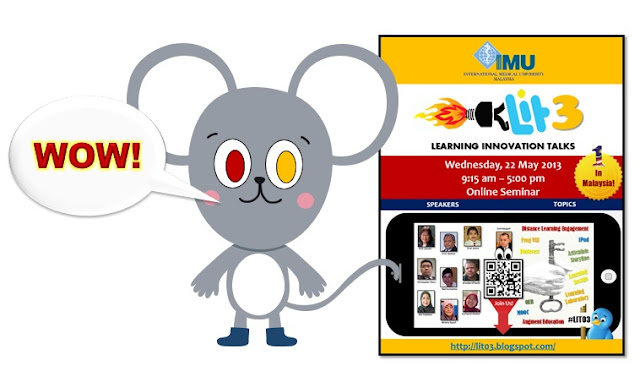Tuesday, March 10, 2015
What I learned about agile teams from 8 9 year old girls basketball
- If you are the PM, dont take sole responsibility of the budget, tasks, project goals etc. Make these visible to your team and help your team own them and make decisions about tasks and priorities together.
- If you are the DBA, dont get upset when the database design is insufficient, teach the team how to improve their design the first time. Work with them rather than fixing their work later.
- If you are a tester, dont assume full responsibility for testing, teach your team how to be better testers by testing every day and pair testing with the developers.
- If you are the UI expert, involve your team when designing the UI. Lead the exercise, but dont steal the design for yourself.
- If you are a developer, take responsibility for the budget and priorities
- If you are a tester, learn how to code a little
- etc.
Wednesday, March 4, 2015
Learning Innovation Talks 03 LIT03 ! WOW!

LEARNING INNOVATION TALKS 03
- FIRST 1-Day Online Seminar held by a University in Malaysia.
- Opportunity to connect and engage with AWESOME EDUCATORS.
- Learn SIZZLING NEW TRICKS and tips on how to use technology to transform learning.
- Exposure to the LATEST TRENDS in e-learning.
- Will Get a DIGITAL CERTIFICATE OF ATTENDANCE if you register and attend.

ORGANIZER
The 3rd Learning Innovation Talks (LIT) is organized by the International Medical University (IMU). This is the first LIT (history) to be done fully online. And this is totally inline with IMUs 3Is, which are Insight, Imagination and Innovation.Here is IMUs e-Learning Team masterminding this mission:

- Program & Speakers
- Online Registration Form
- LIT History
- FAQs
Looking forward to YOUR PARTICIPATION! Thanks :)
Monday, March 2, 2015
Informal Learning 3 Free Chapters Jay Cross
- Link to Informal Learning Book (chapters 1-3 are free. More soon?)
- Informal Learning Blog
 JAY CROSS?
JAY CROSS?
Jay Cross has challenged conventional wisdom about how adults learn since designing the first business degree program offered by the University of Phoenix thirty years ago. "I am dedicated to making people more effective in their jobs and happy in their lives," says Jay. "My calling is to change the world by helping people learn to learn."
Jay coined the term eLearning. He co-authored Implementing eLearning, founded Internet Time Group, served as CEO of eLearning Forum for its first five years, and writes a column on effectiveness for CLO magazine. An internationally acclaimed strategist, speaker, and designer of corporate learning and performance systems, Jay is a graduate of Princeton University and Harvard Business School (Source).
INFORMAL LEARNING?
MORE JUICE?
Explore his book entitled "Informal Learning: Rediscovering the Natural Pathways That Inspire Innovation and Performance". Wait a second! Before you consider buying his book, perhaps you should download the first three chapters for FREE and learn informally (PDF format):
- Chapter 1: Out of Time.
- Chapter 2: A Natural Way of Learning.
- Chapter 3: Show Me The Money
- Informal Learning - Low Hanging Fruit
- Informal Learning: A Sound Investment
- Not Without Purpose
- Web 2.0 and the Evolution of Instructional Design
- Knowledge Flows
- The Learning Mixer
- Changes Ahead
- Learning in the Real World
- Informal Learning research findings, presentation
Now, if you are still hungry to learn more from Jay Crosss expertise and wisdom, I suppose you should consider buying his book :)